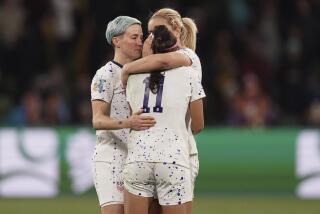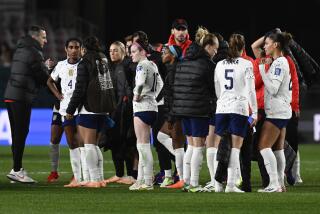Popularity Isn’t Golden : If Peterson Is a Coach Only His Players Could Love, That’s OK by Him
- Share via
MERIBEL, France — His players call him “Big Daddy.” His coaching rivals sometimes call him names that ring with expletives.
Dave Peterson wasn’t out to win friends when he agreed to coach the U.S. hockey team for a second successive Olympics, and his team’s occasional rough play--coupled with his shows of public rudeness--ensure he won’t receive any awards for congeniality.
But like him or not, the 61-year-old Minnesotan has guided the U.S. team to the Olympic tournament semifinals and a matchup Friday against the Unified Team, the best performance by a U.S. hockey team since Herb Brooks’ squad won the gold medal at Lake Placid in 1980.
“He’s been great,” said defenseman Moe Mantha, a veteran of 12 NHL seasons and at least that many coaches. “I think he’s been honest. His nickname is Big Daddy because he looks after his kids. He has 23 kids, and he’ll go to the wall for us.”
Peterson built a defensive wall around himself and his team at Calgary, becoming renowned as “the ugly American” of the 1988 Games because of his gruff, defensive dealings with reporters. Given a second chance, he has shown more flexibility as a coach and more patience as a person.
This time, when he designed a long and difficult pre-Olympic schedule to toughen his players for international competition, he made sure he had a large roster so players’ bodies and egos wouldn’t be battered in repeated losses to NHL teams. When it became obvious that his defense was too porous, he overhauled it in December and January, adding Mantha, Greg Brown, Guy Gosselin and Sean Hill, who have been instrumental in the team’s success.
That success here is in sharp contrast to 1988, when Peterson’s team finished seventh despite having Tony Granato, Brian Leetch, Craig Janney, Mike Richter, Kevin Stevens and half a dozen others who have achieved stardom in the NHL. But if he considers the turnaround a personal triumph, he won’t acknowledge it.
“I’m not in the vindication business,” he said. “I’m in the coaching business, thank you.”
His coaching job here has been impressive, and he was quick to correct his most obvious tactical mistake, that of failing to prod his team out of its defensive posture in the third period of Monday’s 3-3 tie with Sweden.
When the United States took a 4-1 lead over France in its quarterfinal playoff game Tuesday, Peterson kept one forechecker going at the French instead of telling the forwards to join the defensemen in sitting on the lead. And to rekindle the fiery spirit that has been mentioned as his team’s greatest strength, Peterson made an impassioned speech between the first and second periods of that game while his team trailed, 1-0. The ploy worked. His players scored three times in the second period and once in the third.
“It was kind of a wake-up call,” he said Wednesday at the athletes’ village in La Tania. “I don’t do that very often. If you do it on a regular basis, it has no impact.
“They were more mentally tired than physically tired. We had played four lines the night before so physical fatigue shouldn’t have been a factor. But some of the young kids had not had a good warm-up and it was in their minds. I don’t even watch the warm-ups, but (goaltender coach) Keith Allain did and he felt some of them were dwelling on that fact. I just think we needed a minor shock.”
Of course, Ray LeBlanc’s brilliant goaltending has made Peterson look good, but without Peterson’s emphasis on overall team defense, LeBlanc would be bombarded with shots that are more dangerous and from closer range than most he has had to face. His team is generally disciplined, with occasional lapses.
“If they play as good against the Russians as they did against Finland and Sweden, they can beat the Russians,” Finnish defenseman Arto Ruotanen said.
Peterson has never coached a team to victory over the Olympic or national teams of the country formerly known as the Soviet Union. He lost to the Soviets twice in the world championship tournament at Prague in 1985, again at Moscow in 1986, Vienna in 1987 and at the 1988 Calgary Olympics. Through the years, he has learned much about the coaching skills of his counterpart, Viktor Tikhonov, but little about Tikhonov personally.
“He’s in a new situation,” Peterson said. “He has a younger team than he’s had, and he also has kids who have more freedom. Before, whatever he said had to be done. It’s much closer to the situation in North America, where you can’t rule with an iron hand.
“He’s an excellent tactical coach. I’m not a bit surprised his team is here. You have to remember they have a vast, vast pool of hockey talent. The big five (Vladimir Krutov, Igor Larionov, Sergei Makarov, Viacheslav Fetisov and Alexei Kasatonov) were coming to the end of their careers and they lost some young talent like (Sergei) Fedorov. . . .
“It’s pretty hard to pick a weak spot as such. I don’t think they have one. We have to not take some of the bad penalties we’ve taken. They’re probably the best team in the tournament, as far as power play. We have to play disciplined and stay out of the penalty box.”
Peterson maintains that he did not lose control of his emotions Monday, when he twice refused to shake hands with Swedish coaches Conny Evensson and Curt Lundmark after the teams’ 3-3 tie. His actions were in protest to the check by Mats Naslund that left U.S. defenseman Greg Brown with a concussion, as well as the Swedish coaches’ refusal to shake his hand after a pre-Olympic exhibition in Chamonix, France.
“I knew exactly what I was doing,” he said. “You ought to check what happened in Chamonix. I haven’t lost it. I knew exactly what was said and what I did. The Swedish coaches can do what they want to do. That’s their business.”
His business is to help his team develop its potential in its next two games. Asked if he might return for the 1994 Games, he replied: “I’m not worried about that. I worry about what’s happening here. It’s my intention to go back to the player development desk at USA Hockey.”
It would be a more pleasant return with a medal in hand.
More to Read
Go beyond the scoreboard
Get the latest on L.A.'s teams in the daily Sports Report newsletter.
You may occasionally receive promotional content from the Los Angeles Times.







